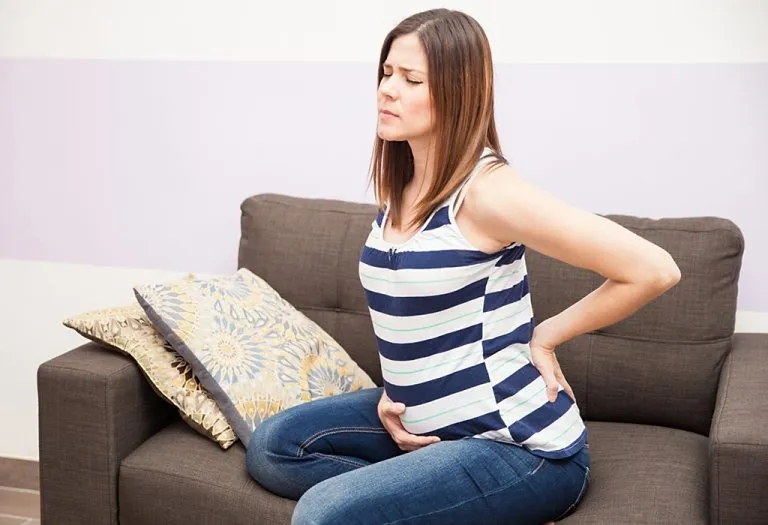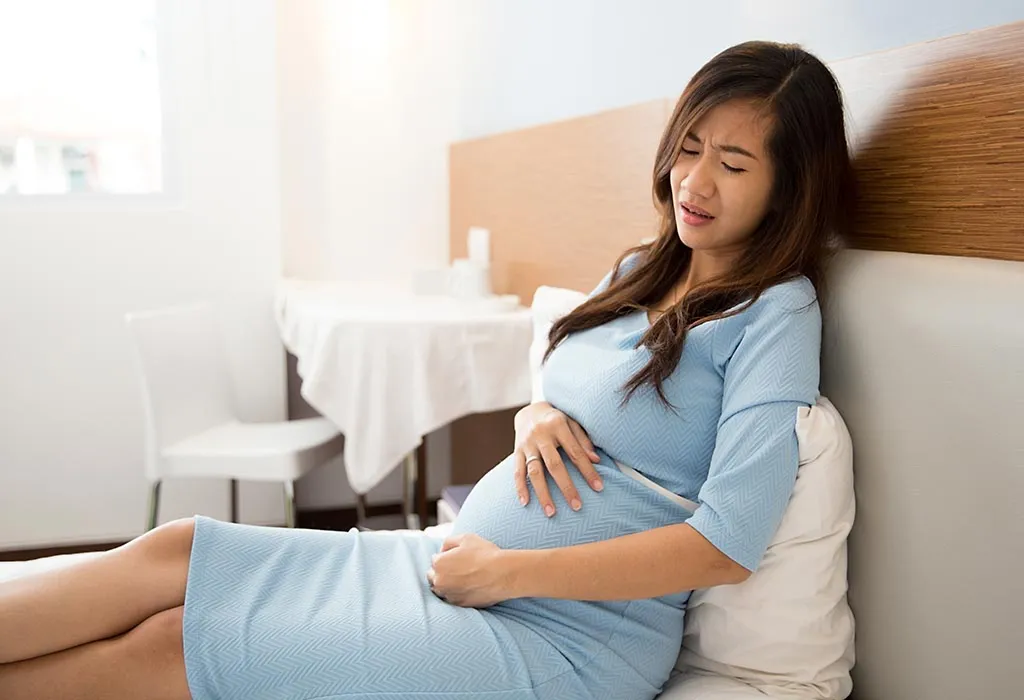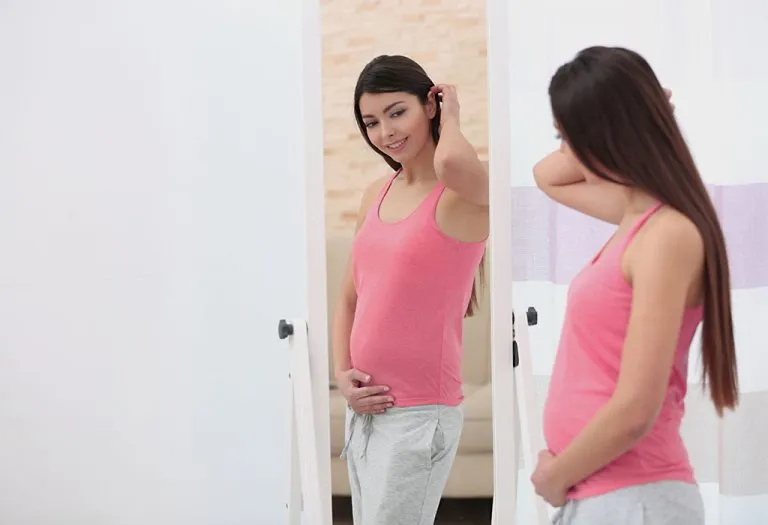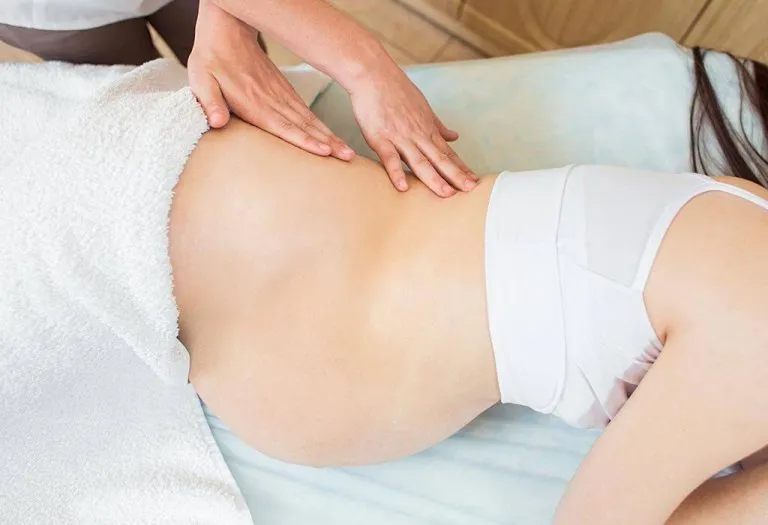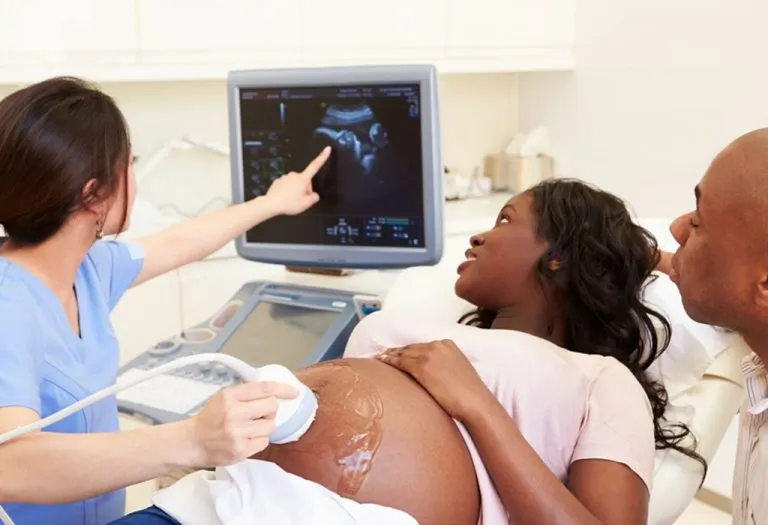Pregnancy Discomforts and Pains – Types and Solutions
Pain during pregnancy is usually nothing to be worried about unless it is associated with preeclampsia or pre-term labour. These body aches and pains are usually due to the body changes that take place and also due to the increase in body weight during pregnancy. Among the common discomforts in pregnancy, women often experience various types of pains during pregnancy, such as lower back pain, pelvic pressure, round ligament pain, and leg cramps. While these discomforts are typically normal and a result of the body adapting to support the growing baby, it is always advisable to consult a healthcare provider if the pain becomes severe or persistent, to rule out any underlying complications.
Is It Normal to Feel Discomfort During Pregnancy?
Yes, it is completely normal to feel discomfort during pregnancy. Pregnancy involves significant physical and hormonal changes as your body adapts to support the growth and development of your baby. Common discomforts in pregnancy include nausea, fatigue, back pain, pelvic pressure, and swelling, among others (1). These discomforts are often a result of the increased weight, shifting centre of gravity, and hormonal fluctuations that occur during this time. While most of these types of pains during pregnancy are normal and temporary, it is important to monitor your symptoms and consult your healthcare provider if you experience severe, persistent, or unusual pain, as it could indicate a more serious condition.
Common Discomforts and Pains During Pregnancy
Pregnancy has its share of woes. It comes with a whole lot pains and aches. Listed below are some of the common pregnancy pains and aches that one may experience while pregnant.
1. Abdominal Pain
This is the most common type of pregnancy pain. Usually, this kind of pregnancy pain symptoms is absolutely normal. It could be due to gas, heartburn, constipation and even due to the growing baby inside (2). The pain could also be due to implantation cramping when at the very beginning of pregnancy. Another reason could be due to the stretching of round ligaments that support the uterus. False labour or Braxton-Hicks contractions, an 8th month pregnancy pain can also be one of the reasons for abdominal pain. During true labour too, most of them experience severe cramping.
Solution : Abdominal pain during pregnancy due to minor issues can be reduced by avoiding quick waist movements, bending towards the pain, drinking water as much as possible, stretching a little or walking around to release gas.
When to Consult a Doctor: If pain persists for a long time, with or without vaginal bleeding or white discharge, you should consult your Gynaecologist.
2. Back Pain
There are two types of back pain that can occur during pregnancy. One is the Lumbar or lower back pain, and the other one is the Posterior pelvic pain. A backache during pregnancy can be for a number of reasons like weight gain, bad posture, hormonal changes, separation of the muscles due to the expansion of the uterus and of course stress (3).
Solution
Back pain can be managed with proper posture while sitting and standing, exercises which are appropriate at that stage of pregnancy, and sleeping on your left side with a pillow in between the two legs. Acupuncture can also be effective in relieving pregnancy-related back pain. Applying hot and cold pads on the affected area can also go a long way in curing the pain.
When to Consult a Doctor
If your backache during pregnancy is accompanied by fever, it could be a sign of infection. A pain that goes from bad to worse or severe pain which makes it difficult for you to even urinate should be discussed with your doctor right away.
3. Vaginal Pain
Vaginal pain is one among the few early pregnancy pains. The reason could be the expanding of your uterus and the increase in the volume of blood in the pelvic region. Even constipation (which can be a result of pregnancy hormones and the iron vitamins prescribed during pregnancy) could be a reason behind the pain.
Solution
If constipation is a concern for you during pregnancy, include more of fibre-rich food in your daily diet and also drink as much water as you can. You can also ask your doctor for pregnancy safe stool softeners. Practising few pelvic exercises can help you to ease the pain. Get pregnancy safe massages from a trained therapist and also take a soothing warm bath. You can also try out pregnancy support garment which supports the belly thereby taking away the pressure from the pelvic region, hips and lower back area.
When to Consult a Doctor
You should look for danger signs of vaginal bleeding along with pain, severe pelvic pain that walking around becomes difficult, severe headache, light-headedness, body swelling, fever or chills. If you find any of these symptoms along with vaginal pain, consult your doctor.
4. Carpal Tunnel Syndrome
Pain in the wrist, finger joints along with numbness in the fingers with a tingling sensation are the common symptoms of Carpal Tunnel Syndrome (4). During pregnancy, this usually occurs in the second, third trimester and can even continue post-delivery. At times, the pain becomes so severe that it is almost impossible to hold the baby!
Solution
Getting a massage by a trained therapist could help in healing the pain. Cold and hot compresses on the affected area, rotating and shaking the wrists time to time or wearing a splint while doing activities that increase the pain are some other reasons that can give some relief from the pain and numbness of Carpal Tunnel Syndrome.
When to Consult a Doctor
Severe pain in the wrist or extreme numbness which makes grasping or holding things difficult can be a thing of concern. Therefore, in conditions like this, consult a doctor. You can also call on your doctor if the symptoms persist way post delivery.
5. Headaches
It is common to suffer from headaches during the early pregnancy phase. However, it becomes infrequent or completely stops in the last two trimesters.
Solution
Cold compresses, head massages, drinking lots of water, getting good sleep, going for walks and relaxing to be stress-free are some of the ways to cure a headache during pregnancy. You may also take some painkillers for this pain in early pregnancy, but only after consulting your doctor.
When to Consult a Doctor
At times headaches during pregnancy could mean something serious. Therefore always consult your doctor when with a severe headache you have blurred vision, flashes in your eyes, severe pain below the ribs, nausea, and body swelling. These could be signs of preeclampsia.
6. Leg Cramps
Leg cramps is a stinging pain that shoots up all of a sudden. At times you may even need help from someone to straighten your leg. These cramps cause pain in the calves and even at the back of the thigh. Bad circulation in the leg and thighs could be the reason behind such sudden cramps (5).
Solution
As soon as you get a cramp, get up and try to stretch your leg. You could even ask somebody to help you to do so. Then stand and try to move your leg and foot while holding onto something or someone. It is also suggested that magnesium supplements can help in reducing muscle cramps. You can take food rich in magnesium instead of the supplements.
When to Consult a Doctor
You can call on your Doctor if you have frequent and extremely painful leg cramps.
7. Sciatica
The hormone relaxin starts preparing the pelvis for childbirth. As a result, the ligaments loosen, and the sciatic nerve gets squeezed in between. This is when there is shooting pain down the buttocks and the back of the legs.
Solution
Homoeopathy can give relief from sciatica pain. Other than that, you can take a bath with warm water or apply heating pads on the affected area.
When to Consult a Doctor
As soon as you experience a shooting pain down your buttocks and the back of your legs, you should go visit your doctor.
8. Haemorrhoids
One of the reasons of Haemorrhoids during pregnancy is the common and severe constipation problem due to hormonal changes (6).
Solution
The first thing that one should do to cure haemorrhoids is to prevent constipation. It can be cured by drinking lots of water and including lots of fibre-rich food in the diet. The food should be healthy and less spicy. Taking warm baths with baking soda can increase blood circulation in the area. In order to get relief from the itch in the haemorrhoids, you can apply baking soda paste in the area. Witch Hazel and lemon juice can cure the swelling and bleeding in the Haemorrhoids.
Non-surgical solutions include Bipolar coagulation, Haemorrhoidal Arterial Litigation, Rubber Banding, and Freezing. Surgery may be required when bleeding from the Haemorrhoids cannot be controlled, or there are multiple haemorrhoids, both internal as well as external.
When to Consult a Doctor
Consult a doctor when you experience severe pain and bleeding.
9. Rib Pain
It usually occurs during the last trimester. However, some may experience it in the early trimesters as well. The pain is a result of the baby getting bigger and pushing against the rib while trying to adjust itself.
Solution
You can get some relief from rib pain only after the 36th week when your uterus and baby drops slightly. Till then, one has to make do with temporary pain relief by wearing loose clothes, maintaining correct posture, using pillows, walks, yoga and warm baths.
When to Consult a Doctor
You should consider talking to your doctor and ask for medication if you have severe pain in your rib cage.
10. Breast Pain
Breast tenderness can occur in any of the trimesters or all of the trimesters. This is basically due to the hormonal changes that take place during pregnancy. The pain during the third trimester is also on account of the milk glands preparing themselves to manufacture colostrum (7).
Solution
Breast tenderness is common during pregnancy, and there is no permanent way to relieve the pain. However, the pain can be reduced by wearing a supportive bra and gently washing instead of vigorously scrubbing the area during baths.
When to Consult a Doctor
When the breast feels extremely sore with reddish skin or rash, you should consult a doctor.
11. Pelvic Girdle Pain (PGP)
Pelvic Girdle Pain (PGP) is a common discomfort during pregnancy, characterized by pain in the pelvic joints, including the pubic bone, hips, and lower back. This pain occurs due to the loosening of ligaments caused by the hormone relaxin, which prepares the body for childbirth. The added weight of the growing baby and changes in posture can exacerbate the discomfort.
Solution
To manage PGP, avoid activities that worsen the pain, such as heavy lifting or standing for long periods. Use a pelvic support belt to stabilize the joints and reduce pressure. Gentle exercises, such as pelvic tilts or swimming, can strengthen the muscles around the pelvis. Applying a warm compress to the affected area can also provide relief.
When to Consult a Doctor
If the pain is severe, affects your mobility, or makes it difficult to perform daily tasks, consult your doctor. They may recommend physical therapy or other treatments to alleviate the discomfort.
12. Round Ligament Pain
Round ligament pain is a sharp, stabbing, or aching sensation in the lower abdomen or groin area. It occurs when the round ligaments—bands of tissue that support the uterus—stretch and thicken to accommodate the growing baby. This pain is most common during the second trimester and can be triggered by sudden movements, such as coughing, sneezing, or standing up quickly (8).
Solution
To relieve round ligament pain, avoid sudden movements and change positions slowly. When you feel the pain, try bending toward the discomfort to ease the tension. Applying a warm compress or taking a warm bath can also help relax the muscles. Gentle stretching exercises, such as prenatal yoga, can improve flexibility and reduce pain.
When to Consult a Doctor
If the pain is severe, persistent, or accompanied by other symptoms like fever, bleeding, or contractions, consult your doctor to rule out more serious conditions.
13. Swollen Feet and Ankles
Swelling in the feet and ankles, also known as edema, is a common discomfort during pregnancy. It occurs due to increased fluid retention and pressure on the blood vessels from the growing uterus. Swelling is often more noticeable in the third trimester and after long periods of standing or sitting.
Solution
To reduce swelling, elevate your feet whenever possible and avoid standing for long periods. Wear comfortable, supportive shoes and avoid tight socks or stockings that restrict circulation. Staying hydrated and reducing salt intake can also help minimize fluid retention. Gentle exercises, such as walking or ankle rotations, can improve blood flow.
When to Consult a Doctor
If swelling is sudden, severe, or accompanied by pain, redness, or warmth in the affected area, consult your doctor. These could be signs of a blood clot or preeclampsia, a serious pregnancy complication.
14. Heartburn
Heartburn is one of the first trimester discomforts. This burning sensation in the chest or throat, is a common discomfort during pregnancy. It occurs due to hormonal changes that relax the valve between the stomach and esophagus, allowing stomach acid to rise (9). The growing uterus also puts pressure on the stomach, exacerbating the issue.
Solution
To manage heartburn, eat small, frequent meals and avoid spicy, greasy, or acidic foods. Sit upright for at least 30 minutes after eating to prevent acid reflux. Drinking milk or eating yogurt can help neutralize stomach acid. Over-the-counter antacids may provide relief, but consult your doctor before taking any medication.
When to Consult a Doctor
If heartburn is severe, persistent, or accompanied by difficulty swallowing, consult your doctor. These could be signs of a more serious condition, such as gastroesophageal reflux disease (GERD).
15. Constipation
Constipation is a common discomfort during pregnancy, caused by hormonal changes that slow digestion and the pressure of the growing uterus on the intestines. Iron supplements, often prescribed during pregnancy, can also contribute to constipation.
Solution
To prevent constipation, eat a high-fibre diet rich in fruits, vegetables, and whole grains. Drink plenty of water and stay physically active to stimulate digestion. Prunes or prune juice can act as a natural laxative. If necessary, consult your doctor about safe stool softeners or laxatives.
When to Consult a Doctor
If constipation is severe, accompanied by pain, or lasts for more than a few days, consult your doctor. These could be signs of a more serious issue, such as a bowel obstruction.
16. Fatigue
Fatigue is a common discomfort during pregnancy, especially in the first and third trimesters. It is caused by hormonal changes, increased blood volume, and the extra energy required to support the growing baby (10).
Solution
To combat fatigue, prioritize rest and sleep. Take short naps during the day if needed, and establish a regular sleep routine. Eat a balanced diet rich in iron and protein to maintain energy levels. Gentle exercises, such as walking or prenatal yoga, can also boost energy.
When to Consult a Doctor
If fatigue is extreme, persistent, or accompanied by other symptoms like dizziness, shortness of breath, or pale skin, consult your doctor. These could be signs of anemia or other underlying conditions.
17. Nausea and Morning Sickness
Nausea and vomiting, often referred to as morning sickness, are common early pregnancy discomforts. These symptoms are caused by hormonal changes and typically subside by the second trimester.
Solution
To manage nausea, eat small, frequent meals and avoid spicy or greasy foods. Ginger tea, crackers, or bland foods like toast can help settle your stomach. Stay hydrated by sipping water or clear broths throughout the day. Acupressure wristbands may also provide relief.
When to Consult a Doctor
If nausea is severe, persistent, or leads to dehydration (symptoms include dark urine, dizziness, or rapid heartbeat), consult your doctor. These could be signs of hyperemesis gravidarum, a condition that requires medical treatment.
18. Insomnia
Insomnia, or difficulty sleeping, is a common discomfort during pregnancy. It can be caused by hormonal changes, physical discomfort, anxiety, or frequent trips to the bathroom (11).
Solution
To improve sleep, establish a relaxing bedtime routine, such as taking a warm bath or reading a book. Use pillows to support your belly and legs while sleeping. Avoid caffeine and heavy meals before bedtime. Practising relaxation techniques, such as deep breathing or meditation, can also help.
When to Consult a Doctor
If insomnia persists or significantly affects your daily functioning, consult your doctor. They may recommend safe sleep aids or other treatments.
19. Shortness of Breath
Shortness of breath is a common discomfort during pregnancy, especially in the third trimester. It occurs due to the growing uterus pressing against the diaphragm and hormonal changes that affect lung capacity.
Solution
To manage shortness of breath, sit or stand upright to give your lungs more space. Practise deep breathing exercises to improve oxygen flow. Avoid overexertion and take breaks when needed. Sleeping propped up with pillows can also help.
When to Consult a Doctor
If shortness of breath is severe, sudden, or accompanied by chest pain, rapid heartbeat, or dizziness, consult your doctor immediately. These could be signs of a more serious condition, such as a blood clot or heart issue.
20. Varicose Veins
Varicose veins are swollen, twisted veins that often appear in the legs during pregnancy. They occur due to increased blood volume and pressure on the veins from the growing uterus (12).
Solution
To prevent varicose veins, avoid standing or sitting for long periods. Elevate your legs whenever possible and wear compression stockings to improve circulation. Regular exercise, such as walking or swimming, can also help.
When to Consult a Doctor
If varicose veins are painful, inflamed, or accompanied by skin changes, consult your doctor. They may recommend treatments such as sclerotherapy or laser therapy.
21. Hip Pain
Hip pain is a common discomfort during pregnancy, caused by the loosening of ligaments and pressure on the joints from the growing baby.
Solution
To relieve hip pain, use pillows for support while sleeping and avoid sitting on hard surfaces. Gentle stretches, such as prenatal yoga, can improve flexibility and reduce discomfort. Applying a warm compress to the affected area can also help.
When to Consult a Doctor
If hip pain is severe, persistent, or affects your mobility, consult your doctor. They may recommend physical therapy or other treatments.
22. Dizziness
Dizziness during pregnancy is often caused by changes in blood pressure, low blood sugar, or dehydration (13).
Solution
To prevent dizziness, stay hydrated and eat small, frequent meals. Avoid standing up quickly, and sit or lie down if you feel lightheaded. Wearing loose clothing and avoiding hot environments can also help.
When to Consult a Doctor
If dizziness is frequent, severe, or accompanied by fainting, blurred vision, or rapid heartbeat, consult your doctor. These could be signs of anemia or other underlying conditions.
23. Braxton-Hicks Contractions
Braxton-Hicks contractions, often called “practice contractions,” are irregular and usually painless tightening of the uterus. They are more common in the third trimester and help prepare the body for labour.
Solution
To relieve Braxton-Hicks contractions, change positions, drink water, or take a warm bath. Practising relaxation techniques, such as deep breathing, can also help.
When to Consult a Doctor
If contractions become regular, painful, or increase in intensity, consult your doctor. These could be signs of preterm labour.
24. Tailbone Pain
Tailbone pain, or coccydynia, is caused by pressure from the growing uterus on the tailbone. It is more common in the later stages of pregnancy (14).
Solution
To relieve tailbone pain, use a doughnut-shaped pillow when sitting and avoid prolonged sitting. Gentle stretches and warm compresses can also provide relief.
When to Consult a Doctor
If tailbone pain is severe or persistent, consult your doctor. They may recommend physical therapy or other treatments.
25. Itchy Skin
Itchy skin during pregnancy is often caused by stretching skin and hormonal changes. In some cases, it may be a sign of a condition called cholestasis of pregnancy.
Solution
To relieve itching, moisturise regularly and wear loose, comfortable clothing. Avoid hot showers, which can dry out the skin. Oatmeal baths or calamine lotion can also help.
When to Consult a Doctor
If itching is severe, widespread, or accompanied by a rash, consult your doctor. These could be signs of a more serious condition.
26. Frequent Urination
Frequent urination is a common discomfort during pregnancy, caused by pressure on the bladder from the growing uterus (15).
Solution
To manage frequent urination, empty your bladder completely and avoid caffeine. Practising Kegel exercises can strengthen the pelvic floor muscles.
When to Consult a Doctor
If frequent urination is accompanied by pain, burning, or fever, consult your doctor. These could be signs of a urinary tract infection.
27. Nasal Congestion
Nasal congestion during pregnancy is caused by hormonal changes that increase blood flow to the mucous membranes.
Solution
To relieve nasal congestion, use a humidifier and saline nasal drops. Avoid decongestant medications unless approved by your doctor.
When to Consult a Doctor
If nasal congestion is severe, persistent, or accompanied by fever, consult your doctor. These could be signs of a sinus infection.
FAQs
1. Why do I feel a “pins and needles” sensation in my hands and feet during pregnancy?
The “pins and needles” sensation, also known as paresthesia, is often caused by swelling and fluid retention during pregnancy, which can compress nerves, particularly in the wrists (carpal tunnel syndrome) or legs. Hormonal changes and increased blood volume can also contribute to this unusual sensation.
2. Why do I get a metallic taste in my mouth during pregnancy?
A metallic taste, known as dysgeusia, is a lesser-known but common pregnancy symptom caused by hormonal fluctuations, particularly increased estrogen levels. This can alter your sense of taste and make certain foods or even water taste metallic or unpleasant.
Almost all the aches and pains that you experience during pregnancy are normal and nothing to be worried about. However, some might require medical intervention. Therefore, if you feel a hitch, always make sure to share your concern with your doctor.
References/Resources:
1. Cleveland Clinic – Pregnancy Discomforts
2. NHS – Stomach pain in pregnancy
3. Johns Hopkins Medicine – Back Pain in Pregnancy
4. Pregnancy, Birth & Baby – Carpal tunnel syndrome and pregnancy
5. Pregnancy, Birth & Baby – Leg cramps during pregnancy
6. Cleveland Clinic – Hemorrhoids During Pregnancy
7. Johns Hopkins Medicine – Breast Pain: 10 Reasons Your Breasts May Hurt
8. NHS Royal Berkshire – Round ligament pain in pregnancy
9. NHS – Indigestion and heartburn in pregnancy
10. Pregnancy, Birth & Baby – Fatigue and tiredness during pregnancy
11. Cleveland Clinic – Pregnancy Insomnia
12. Nemours Kids Health – Why Do Some Pregnant Women Get Varicose Veins?
13. American Heart Association – Dizziness during pregnancy: When is it a concern?
14. What to do when pregnancy becomes a pain in the tailbone – UT Southwestern Medical Center
15. Pregnancy, Birth & Baby – Frequent urination during pregnancy
Also Read:
Cramping in Pregnancy
Rib Pain during Pregnancy
Chest Pain while Pregnancy
Round Ligament Pain in Pregnancy
Was This Article Helpful?
Parenting is a huge responsibility, for you as a caregiver, but also for us as a parenting content platform. We understand that and take our responsibility of creating credible content seriously. FirstCry Parenting articles are written and published only after extensive research using factually sound references to deliver quality content that is accurate, validated by experts, and completely reliable. To understand how we go about creating content that is credible, read our editorial policy here.





